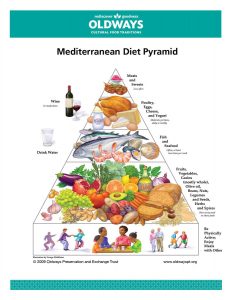One of the least controversial diets, the Mediterranean diet claims to decrease weight gain, high blood pressure, cholesterol and even waist circumference! Year after year, experts rate it as one of the healthiest diets in the world!
What makes the Mediterranean diet “better” than other diets? Rather than being a restrictive food plan, the Mediterranean diet encourages a healthy way of eating based on the region’s traditional foods – mainly fruits, vegetables, nuts, and olive oil. The inhabitants around the Mediterranean Sea were known to have a lower risk of diseases like cancer, heart disease and diabetes. To this day, the Mediterranean diet remains one of the most nutritious diets.
How to follow the Mediterranean Diet
The Mediterranean diet emphasizes specific food groups while limiting others. It encourages more fruits, vegetables, whole grains, legumes, nuts, fish and olive oil, while limiting processed foods, sweets, high-sodium foods, dairy and meats. The focus is on eating foods that are rich in monounsaturated fats, fibre and omega-3 fatty acids.
Foods to eat
Healthy fats: The main source of fat is olive oil, with other healthy fats like avocados, nuts and seeds. High in monounsaturated fats, healthy fats can decrease the risk of heart disease. Another important part of the diet consists of omega-3 fatty fish, which help to reduce triglycerides, blood pressure and inflammation. [1]
Antioxidant-rich foods: Fruits and vegetables are anti-inflammatory in nature, and also full of antioxidants, vitamins, minerals and fibre. They should be eaten at every meal for good health.
Foods to avoid
White flour products: Breads, pasts, cereals and baked goods are made from refined white flour that is devoid of vitamins and nutrients, while being high in sugar. In high amounts, these foods can lead to increased body fat, cholesterol and inflammation. [2]
Red meats: Lean meats such as poultry or turkey are preferred, as red meat is higher in saturated fats. Studies show that processed meats may have a harmful effect on LDL cholesterol (bad cholesterol), although the research is mixed. [3] If you’re looking for healthy omega-3 fats from a meat source, an option is grass-fed beef.
A sustainable and holistic approach
Beyond choosing the right foods, this diet emphasizes lifestyle habits to build a sustainable and holistic approach to health.
Exercise: The Mediterranean diet does not neglect the importance of exercise in a healthy lifestyle. However, exercise does not have to be anything straining or difficult. Stick to what you enjoy and do it routinely, whether that be dancing, walking or your favourite sports activity!
Healthy eating habits: Rather than eliminating any food group, the Mediterranean diet encourages you to eat more healthy foods. It is an excellent way to adopt healthy eating habits for life!
The evidence behind the Mediterranean diet claims:
Heart health
Studies show that people who follow the Mediterranean diet have a 25% less risk of developing cardiovascular disease, as it decreases blood sugar imbalances and inflammation. [4] This proves that if you are at risk of heart disease, you may not be restricted to follow a low-fat diet. Rather, healthy fats from avocado, fatty fish, nuts and olive oil can be beneficial.
Weight management
This diet contains ample amount of healthy fats and fibre, which will leave you feeling satiated after eating. Fibre is digested slowly and prevents blood sugar spikes – helping you to maintain a healthy weight. A simple addition of eating 30g of fibre per day has been shown to help you lose weight. [5]
Cognitive function
If you want to retain your brain’s focus, concentration, and memory-storing capabilities, eating a nutritious diet should not be overlooked. People who follow a Mediterranean diet show a slower decline in cognitive function [6] and a decreased risk of Alzheimer’s. This is because eating a diet high in fatty fish has been associated with higher cognitive function – fatty fish is full of omega-3 fats that are needed for optimal brain functions. It’s no wonder that Health Canada recommends fish oil supplementation for both children and adult. Try CanPrev’s Omega-Pro 1:1, which provides 4400mg of wild deep-sea fish oil without fishy taste!
Gut health
Although research on gut health is relatively new, a study showed following this diet can positively alter the gut microbiome, leading to better digestion, lower inflammation and a stronger immune system. [7]
Mood management
Another impressive advantage of the Mediterranean diet – it has been shown to have a protecting effect on preventing and managing depressive symptoms. [8] Studies show that this diet increases BDNF levels, which inversely correlated with major depressive disorder, PTSD, Schizophrenia and Alzheimer’s. [9]
How can you get started today
The truth is, diets with food restrictions tend to cause more problems in the long run. The Mediterranean diet offers a healthy way of eating that is sustainable because it empowers you with a helpful roadmap. Begin swapping out foods for a healthier alternative, move your body often, and surround your meals with people that make you happy. Wherever you are in your journey, you can get started today by making one healthy choice at a time.
References
- Hjalmarsdottir, F. (2018). 17 Science-Based Benefits of Omega-3 Fatty Acids. Retrieved from https://www.healthline.com/nutrition/17-health-benefits-of-omega-3#TOC_TITLE_HDR_5
- Kristensen, M., Toubro, S., Jensen, M. G., Ross, A. B., Riboldi, G., Petronio, M., Bügel, S., Tetens, I., & Astrup, A. (2012). Whole grain compared with refined wheat decreases the percentage of body fat following a 12-week, energy-restricted dietary intervention in postmenopausal women. The Journal of nutrition, 142(4), 710–716. https://doi.org/10.3945/jn.111.142315
- Bergeron, N., Chiu, S., Williams, P. T., M King, S., & Krauss, R. M. (2019). Effects of red meat, white meat, and nonmeat protein sources on atherogenic lipoprotein measures in the context of low compared with high saturated fat intake: a randomized controlled trial. The American journal of clinical nutrition, 110(1), 24–33. https://doi.org/10.1093/ajcn/nqz035
- Ahmad, S., Moorthy, M. V., Demler, O. V., Hu, F. B., Ridker, P. M., Chasman, D. I., & Mora, S. (2018). Assessment of Risk Factors and Biomarkers Associated With Risk of Cardiovascular Disease Among Women Consuming a Mediterranean Diet. JAMA network open, 1(8), e185708. https://doi.org/10.1001/jamanetworkopen.2018.5708
- Ferrari, N. (2015). Making one change — getting more fiber — can help with weight loss. Retrieved from https://www.health.harvard.edu/blog/making-one-change-getting-fiber-can-help-weight-loss-201502177721
- Keenan, T. D., Agrón, E., Mares, J. A., Clemons, T. E., van Asten, F., Swaroop, A., Chew, E. Y., & AREDS and AREDS2 Research Groups (2020). Adherence to a Mediterranean diet and cognitive function in the Age-Related Eye Disease Studies 1 & 2. Alzheimer’s & dementia : the journal of the Alzheimer’s Association, 16(6), 831–842. https://doi.org/10.1002/alz.12077
- Ghosh, T. S., Rampelli, S., Jeffery, I. B., Santoro, A., Neto, M., Capri, M., Giampieri, E., Jennings, A., Candela, M., Turroni, S., Zoetendal, E. G., Hermes, G., Elodie, C., Meunier, N., Brugere, C. M., Pujos-Guillot, E., Berendsen, A. M., De Groot, L., Feskins, E., Kaluza, J., … O’Toole, P. W. (2020). Mediterranean diet intervention alters the gut microbiome in older people reducing frailty and improving health status: the NU-AGE 1-year dietary intervention across five European countries. Gut, 69(7), 1218–1228. https://doi.org/10.1136/gutjnl-2019-319654
- Rienks, J., Dobson, A. J., & Mishra, G. D. (2013). Mediterranean dietary pattern and prevalence and incidence of depressive symptoms in mid-aged women: results from a large community-based prospective study. European journal of clinical nutrition, 67(1), 75–82. https://doi.org/10.1038/ejcn.2012.193
- Lachance, L., & Ramsey, D. (2015). Food, mood, and brain health: implications for the modern clinician. Missouri medicine, 112(2), 111–115.







The post is soo well written and engaging, Your write on amazing topics i must say! I’m a daily reader of your blog. You always write something that helps. Keep it up. 🙂
Hi there! Thank you for your message, we’re glad you found this post helpful!